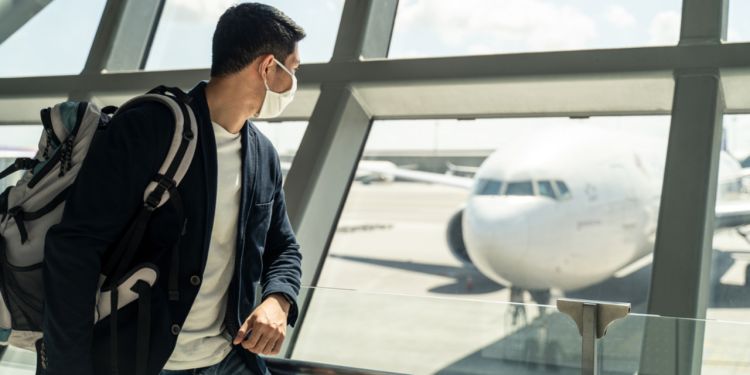
In the coming months, the United Arab Emirates may have to send away many residents due to white and blue-collar job losses as a result of COVID-19 and record low oil prices. Oxford Economics consultancy firm estimates that about 10% (or one million people) of the UAE's residents <
Generalities
How does the UAE prevent the spread of COVID-19?
The Supreme Council for National Security instructs citizens to maintain the distance of two metres from others at all possible times and avoid touch greetings. Masks are mandatory in public spaces, public and private transportation, commercial centres, and when walking outside in high-density areas. Children under the age of two, individuals with a physical or mental impairment who are unable to remove the mask themselves, and those who hold a medical report that confirms respiratory issues are exempt from wearing a mask.
The UAE Government has published a list of health and safety violations for which citizens will be fined. Some of these violations are non-compliance with home quarantine instructions, disobedience to closure instructions of educational institutions, movie theatres, gyms, shopping centres, swimming pools, restaurants and cafés, the conduct of public and private gatherings, and excess of passengers in a vehicle.
When can you remove your mask?
Masks are mandatory in the UAE but can be removed under certain circumstances. If you are the only employee in an office, you can remove your mask. Also, you don't have to wear your mask during vigorous exercise, dental and nose and throat examinations, and hair and beauty treatments. Drivers who are alone in the car or with members of their immediate household, don't have to keep the mask on.
Formalities
Can you travel to the UAE amid the pandemic?
On 23 June 2020, the UAE reopened its airspace, and two weeks later, Dubai started welcoming tourists again. However, up to date, the protocol of health and safety is strict for UAE residents who wish to enter the UAE. UAE residents who are arriving in the UAE from certain countries must take two COVID-19 Polymerase Chain Reaction tests — one no more than 96 hours before their departure time and another one upon arrival at the emirati airport. UAE residents won't be allowed into the country, if unable to present a negative COVID-19 PCR test result in English or Arabic. Children under the age of 12 and travellers with disabilities are exempt from the PCR test requirements.
In addition, all travellers to the UAE will undergo a 14-day home quarantine under the relevant instructions of the authorities. During the quarantine, home visitors are not allowed, and thorough disinfection of shared areas is required. Also, the use of public transport is prohibited, and individuals in quarantine must show preference for online shopping and monitor COVID-19 symptoms.
The DXB Dubai International Airport has launched a COVID-19 application to help passengers obtain accurate information regarding the pandemic, and protect themselves and fellow passengers through personalised support from experts.
Useful link:
Can you get married while COVID-19 measures are in place?
COVID-19 has changed court processes such as marriage. The biggest change is that marriages can be conducted virtually. You have to upload your documents to the Ministry of Justice's website and select an available date for an online appointment with a cleric. You can request your marriage certificate online, but this option existed even before COVID-19.
Since 22 October 2020, wedding receptions and social events have resumed in Dubai according to the Supreme Committee of Crisis and Disaster Management. Celebrations can be held in hotels, halls, and residences as long as COVID-19 measures and safety plans are in place. Attendees must wear face masks and be seated at tables of no more than five people. An event shouldn't exceed four hours, and the maximum number of attendees is 200 for halls and 30 for home celebrations.
Useful link:
Visas
What has changed in visa applications due to COVID-19?
The total population of the UAE is about ten million. Eight and a half million are expats. Hence, it makes sense for a country that is relying exceedingly on expatriation to offer sustainable solutions regarding visas in these unprecedented times.
Expats who hold visas that expired during the pandemic won't pay fines provided that they will leave by 31 December 2020. This grace period has been given due to global travel restrictions.
On 5 October 2020, the UAE resumed the issue of entry and work permits. In fact, the Federal Authority for Identity & Citizenship (ICA) has given permission to employers in the government, semi-government, and domestic sectors to apply for work permits for their expat employees.
UAE expats-to-be must note that each emirate has its own Department of Naturalisation and Residency (or General Directorate of Residency and Foreign Affairs) that issues residence visas (e.g. student visa, employment visa, investor visa).
Useful link:
Federal Authority for Identity & Citizenship
Work
How are employees' health and safety ensured in the UAE during the pandemic?
Companies' internal communications teams are advised to create manuals and training materials with COVID-19 health and safety instructions, which will be communicated to all employees. Also, each company should incorporate a telephone line or an email address which will receive COVID-19-related inquiries and will convey informed guidance and up-to-date facts. Regarding practical amendments in the physical work environment, employers should consider providing separate entry and exit points to minimise contact between employees. Besides, every workplace should have a dedicated area for the disposal of used masks and gloves. Employees who must interact with customers should stand behind a glass barrier. Vending machines and office equipment with high-touch surfaces (e.g. photocopier, fridge, stapler, etc.) should be disinfected frequently and used responsibly. Last but not least, when possible, employers must allow flexible working hours.
Study
How do nurseries and schools operate in the UAE during the pandemic?
Soon after the end of the first wave of the pandemic, the Ministry of Education and the National Emergency, Crisis and Disasters Management Authority (NCEMA), announced the reopening of nurseries and childcare centres upon enforcement of specific measures. The temperature of children and staff must be checked daily to monitor their health status; members of staff must be tested for COVID-19 biweekly; games and toys must be sterilised frequently and sharing among children minimised; meals must be provided by the parents whose entry in the premises is strictly regulated.
Students at school level have the option to attend classes in person, follow the curriculum online from home, or combine the two. Schools that are open to physical presence must follow COVID-19 protocols, including reduction of classroom and bus capacity. The freedom of choice between the two models of learning (i.e. distance learning and face-to-face learning) is currently valid for the first term of the academic year, which started in September 2020. Private schools in Dubai and Sharjah may adapt their education model according to the parents' and students' demand, but the plan is to return to the face-to-face education experience.
Are universities open for in-person learning during the pandemic?
As an answer to the pandemic, each higher education institution in the UAE is offering different learning options that will suit its students the best. Unquestionably, the mental and physical health of students is the priority of every university in the UAE. Depending on the university's resources and size of the student community, some institutions may offer a combination of distance and face-to-face learning while others may focus on returning to normality through face-to-face classes solely. In general, universities accredited by the Ministry of Education must follow the ministry's guidelines and international branch campuses in the UAE must operate in agreement with the home campus.
Sports days and art performances will not be allowed for the academic year 2020-2021, and common areas within the premises will be closed. However, residences on campus will continue to host students, of course, not without ensuring that all health and safety measures are in place.
If you are already a student in the UAE or planning to study in the UAE, get in touch with the administrative team of your department to find out accurate and up-to-date information about changes in operations and COVID-19 protocols. If you are an international student returning to the UAE from abroad, you must declare your travel history to your institution. To resume your studies on campus, you must present a negative PCR test taken no longer than 48 hours before you enter the country, or you must complete the 14-day quarantine.
Accommodation
What is the picture of the UAE real estate market throughout COVID-19?
The UAE has a unique real estate market due to the country's vast expatriate community, which is looking for temporary homes. A report by Deloitte shows that before the pandemic, Dubai and Abu Dhabi accommodation rent prices had declined by about 9% — partly because of the oversupply, which COVID-19 has heightened. In February 2020, Knight Frank real estate consultants stated that 62,500 residential units were to be completed in Dubai alone by the end of the year.
COVID-19 has brought changes in residents' everyday and professional lives, changing their criteria when selecting a house. For example, they are now more concerned about the surrounding facilities, exercising spaces, and soundproof office rooms.
Those who are looking to invest in UAE property should consider the several attractive factors (e.g. low mortgage interest rates, reduced service charges, lower sales prices, higher loan to value ratio, free appliances) which are setting the ground for good purchases despite the pandemic.
Bank
How do emirati banks operate during COVID-19?
Banks in the UAE operate from limited branches and offer limited services, while customers are strongly encouraged to do online and mobile banking. Big banks such as Emirates NBD and Emirates Islamic advise customers to perform banking activities via their mobile applications, websites, and at ATMs or Deposit Machines. To ease banking transactions, most banks have increased their transfer limits for online and mobile banking. To avoid inconveniences, before visiting a branch, customers should check with their bank which branches are open and at what times.
Some of the services that ATMs and online banking provide are fund transfers, bill payments, card replacements, and cheque book requests.
What should you be aware of when banking during COVID-19?
Emirati banks experience high-volume callers as a result of COVID-19. Thus, they kindly request from customers to call only for critical issues and rely on self-service resources within the internet and mobile banking services. However, customers should be aware that fraud is common in crises like the pandemic and scammers may easily take advantage of the global emergency. So, when you are doing online banking, remember never to give out personal information, account and card details, PINs, and passwords.
Tax
Have the deadlines for tax returns passed?
Yes. The Federal Tax Authority announced an extension to the filing and payment deadline for monthly and quarterly VAT returns for the tax period that ended 31 March 2020. The original deadline, which was 28 April 2020 was extended to 28 May 2020. Also, the filing and payment deadline for the excise tax return was extended from 17 April 2020 to 17 May 2020.
What COVID-19 benefits are applied?
The UAE central bank has issued benefits for small and medium-sized enterprises such as loans on zero interest rate, lower interest on real estate loans, and reduction in bank fees for credit cards. Dubai residents are entitled to a 50% reduction in municipality fees, as well as a reduction in electricity and water bills and other governmental charges.
Healthcare
How can you get tested for COVID-19 in the UAE?
The government has set drive-through national screening centres across all emirates. You can download the SEHA app on your mobile or call the national helpline at 8001717 to book an appointment at the nearest available centre. The COVID-19 test is free of charge for those who have serious reasons to believe they have the virus and for vulnerable people. For other groups, the test costs AED 370. Home testing is also available for individuals who are unable to visit a centre due to physical or mental health issues.
For large-scale evaluation of COVID-19 transmitters, the Ministry of Health and Prevention has introduced a laser-based technique which detects virus-caused inflammation in blood samples within seconds. This method isn't replacing Polymerase Chain Reaction tests, but it is the first step to detect suspected cases of COVID-19 within big groups.
Useful links:
ALHOSN mobile app for collective contact tracing
What is the UAE healthcare system doing to maintain and improve the health of the population?
In October 2020, the Dubai Health Authority inaugurated a special hospital for infectious diseases. The 88-bed hospital operates in affiliation with the academic Rashid Hospital for emergency and trauma.
Even those healthcare centres and hospitals that have declared to be COVID-free are instructed to accept COVID-19 cases in their emergency departments, which follow COVID-19 protocols. Patients who are COVID-19 positive and require hospitalisation will be transferred to the nearest COVID-dedicated hospital. So, if you develop COVID-19 symptoms, don't hesitate to walk into any hospital or clinic.
Driver's licence
Has the process of obtaining a driver's licence changed in the UAE due to COVID-19?
The lesson and test requirements haven't changed, except in Ras Al Khaimah, where new driving licence rules such as a minimum of 15 driving lessons have been implemented to improve road traffic safety in the emirate. Also, there are no changes in the issue and renewal of a driver's licence. However, operations of the Happiness Service Centers are following health and safety COVID-19 measures. If you don't want to visit a Happiness Service Center, you can apply online via the Ministry of Interior website or mobile app and receive the driving licence at home.
ATTENTION! To alleviate additional stress from citizens, the government allowed the renewal of driving licences without the eye test certificate and regardless of the driver's black points and status of fines. But drivers must note that the grace period was only valid between 22 March 2020 and 22 June 2020.
Useful links:
What new COVID-19 measures have the driving institutes implemented?
The Emirates Driving Institute has 40 branches across all emirates, which follow similar hygiene standards for the prevention of COVID-19 transmission. Here is what students and students-to-be should keep in mind.
- Students, staff members, and visitors must wear face masks at all times in the institute's premises and vehicles.
- Theory classes are available online, and students are advised to select this option rather than classroom learning.
- Students' body temperature is measured at the allocated entry points.
- At certain institutes, cash payments may not be accepted. For more information on differentiation from one centre to another, as well as opening hours, students should check with the relevant centre before visiting.
- Children between three and 12 years old and people over 60 are not allowed in the facilities.
- Before COVID-19, three students could be in the same car during a test. Now, each test vehicle can have one student only.
Communications
How do UAE telecom companies respond to the surge in demand for their services during the COVID-19 pandemic?
Globally, since the outbreak, telecommunication companies have seen a rise in connectivity due to the increase in citizens working and studying from home. To respond to the high demand, the UAE's biggest government-owned telecommunication companies, Etisalat and Du, have taken measures to ensure they can support customers' requests. Etisalat has increased its local and international data capacity and provided free on-demand movies for families who spend more time at home due to physical distancing. In collaboration with the Ministry of Education, the company has given free mobile data to students whose families don't have the internet at home. Also, Etisalat has granted zero-rate access to selected education URLs allowing students to save their data when studying remotely.
Leisure
Are shops and restaurants open in the UAE during the pandemic?
Yes, shops, malls, and restaurants are open across the country. Dubai authorities issue the Dubai Assured identification to hotels, retailers, food and beverage services, and leisure providers to confirm that they implement all COVID-19 hygiene protocols. In Abu Dhabi, the equivalent health certificate is Go Safe Certification, launched by the Department of Culture and Tourism to reassure citizens and travellers that the Emirati malls, museums, amusement parks, and restaurants are complying with the COVID-19 health measures.
Under the new regulations, service staff in food establishments must wear face masks, and dining facilities must be sanitised daily. Each table cannot have more than eight people at a time, and plexiglass separators between tables are recommended if distancing measures are hard to follow. Customers' dining cannot last longer than three hours, and customers must wear their face masks at all times except when they eat.
Are the UAE beaches open during COVID-19?
Beaches in Dubai, Abu Dhabi, and Sharjah are open. Beachgoers must wear a face mask and follow the new COVID-19 rules such as the maximum group number of five people.
Transport
Is travel within the UAE permitted?
Each emirate is taking different measures when it comes to moving from one emirate to another and entry permission in the emirate. Abu Dhabi, for example, requires laser-based DPI COVID-19 screening before allowing entry to the emirate or the certificate of a negative COVID-19 PCR test, which was taken no longer than 48 hours before reaching the Abu Dhabi checkpoint.
What transport changes have taken place amid the pandemic?
At the beginning of December, Dubai's Roads and Transport Authority (RTA) began to allow bikes and scooters in ferries to ease mobility and enhance the public transport network. Also, in October 2020, RTA launched a new metro bus route (F81) from Al Nahda metro bus stop to Qusais Industrial Area 2.
Removal
Are moving services available in the UAE during the pandemic?
Moving businesses are essential services, and even during the first round of strict COVID-19 measures, they were exempt from ceasing operations. However, some companies may underfunction in order to respond to the health and safety guidelines such as physical distancing and disinfection of moving vehicles. At the same time, demand for movers is high, and the pandemic has played a role in this trend. In fact, some UAE residents want to downsize due to salary cuts while others look for bigger properties to accommodate the needs of their family, which now spends more time at home. Hence, it is important to start looking for a moving company in advance and book a mover at least one week before your moving day.
Can pets travel to the UAE during COVID-19?
Emirates, the largest airline and flag carrier of the United Arab Emirates, allows the transportation of pets only in cargo holds for itineraries ending in Dubai. Passengers with itineraries that start in Dubai can check pets as excess baggage in the hold, as long as the total journey doesn't exceed the 17 hours.
Miscellaneous
Are mosques open in the UAE?
In July, the UAE started reopening mosques while Friday prayers remained suspended. Early in December, the National Emergency Crisis and Disaster Management (NCEMA) announced the reopening of mosques for Friday prayers under strict COVID-19 measures. The capacity of worshippers in the mosque is limited to 30%, and prayers will also be allowed in the courtyards. Worshippers must keep the two-meter distance between each other at all times, and wear a face mask. Mosque doors will open 30 minutes before the prayers and close 30 minutes after to ensure the orderly entry and exit of worshippers. The prayers sermon will last up to ten minutes, and worshippers must bring their own prayer mats. Toilets, ablution places, and women's prayer halls remain close. Food and water are not distributed in mosques, and mosques and churches in industrial areas remain close.
We do our best to provide accurate and up to date information. However, if you have noticed any inaccuracies in this article, please let us know in the comments section below.






